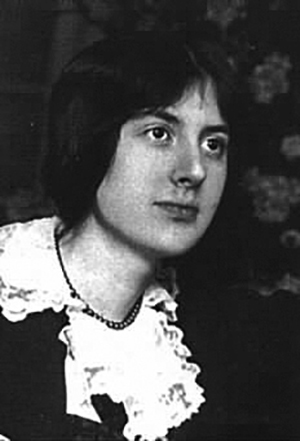
Instrumentation: Full Orchestra
2 3 (2ob, EH) 3 (2cl, Bass-Cl) 3 (2bn, sarrusophone or contra bassoon), 4331, 2perc, hp, celeste, strings
Duration: 11 min
Program Note:
D’un Soir Triste and D’un matin de printemps stand as the last works written in Lili’s own hand — started in the spring of 1917, they were largely finished by January 1918. Lili’s alterations and messy manuscripts were a sign of the physical deterioration she was undergoing, and what she did not complete in nuance of dynamics and articulations in her orchestraion came from Nadia. Lili would dictate her final work, Pie Jesu, to her sister
The work seems to reflect a dark foreboding as it marches on, dirge like. Contemporaneously modern dissonances and swelling dynamics convey an emotional desperation, and the orchestral complexity of cross rhythms, instrumental colorings, and lush divided strings belie her tender age. — Gary Galván
A very deep, intense, and emotional/expressive short piece in the color and style of Ravel. Full of long stretching phrases without too many technically difficult passages. The orchestra is large and it takes a bit time for musicians to understand the harmonic language and dissonance. This can be performed as a set with Boulanger’s D’un matin de printemps or alone. This is the easier one of the two.
Lili Boulanger was a French composer and the younger sister of the noted composer and composition teacher Nadia Boulanger.
A Parisian-born child prodigy, Boulanger’s talent was apparent at the age of two, when Gabriel Fauré, a friend of the family and later one of Boulanger’s teachers, discovered she had perfect pitch. Her parents, both of whom were musicians, encouraged their daughter’s musical education. Her father was 77 years old when Lili was born and she became very attached to him. Her mother, Raissa Myshetskaya (Mischetzky), was a Russian princess who married her Paris Conservatoire teacher, Ernest Boulanger. Her grandfather Frédéric Boulanger had been a noted cellist and her grandmother Juliette a singer. Boulanger accompanied her ten-year-old sister Nadia to classes at the Paris Conservatoire before she was five, shortly thereafter sitting in on classes on music theoryand studying organ with Louis Vierne. She also sang and played piano, violin, cello and harp.
In 1912 Boulanger competed in the Prix de Rome but during her performance she collapsed from illness. She returned in 1913 at the age of 19 to win the composition prize for her Faust et Hélène, becoming the first woman composer to win the prize. Nadia had given up entering after four unsuccessful attempts and had focused her efforts upon her sister Lili, first a student of Nadia and then of Paul Vidal, Georges Caussade and Gabriel Fauré–the last of whom was greatly impressed by the young woman’s talents and frequently brought songs for her to read. Lili was greatly affected by the 1900 death of her father; many of her works touch on themes of grief and loss. Her work was noted for its colorful harmony and instrumentation and skillful text setting. Aspects of Fauré and Claude Debussy can be seen in her compositions, and Arthur Honegger was influenced by her innovative work.
(taken from the Philadelphia Chamber Music Society)
● The Durand score has many mistakes and the rental request needs to be done either on the Durand website, or through Zinfonia search.
● The Fleisher Collection of Orchestra Music (as part of the Free Library of Philadelphia) has published a new set, edited by Clinton F Nieweg). The set is available for rent through the Fleisher Collection. The cost is rather affordable ($100 in 2021) with some shipping and handling fee.
Contact:
Stuart Serio, Assistant Curator
Fleisher Collection of Orchestral Music
Free Library of Philadelphia
1901 Vine St
Philadelphia PA 19103-1116
215-686-5313 tel
serios@freelibrary.org
● Perusal Score Samples
Recording on YouTube by Orchestre du CNSMD de Lyon, conducted by Mikko Franck